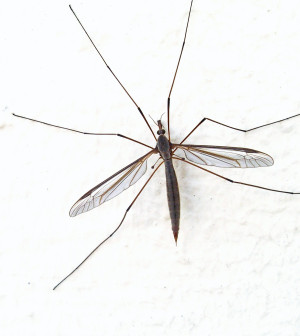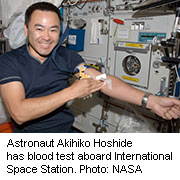- Could Your Grocery Store Meat Be Causing Recurring UTIs?
- Are You Making This Expensive Thermostat Error This Winter?
- Recognizing the Signs of Hypothyroidism
- 10 Strategies to Overcome Insomnia
- Could Artificial Sweeteners Be Aging the Brain Faster?
- Techniques for Soothing Your Nervous System
- Does the Water in Your House Smell Funny? Here’s Why
- Can a Daily Dose of Apple Cider Vinegar Actually Aid Weight Loss?
- 6 Health Beverages That Can Actually Spike Your Blood Sugar
- Treatment Options for Social Anxiety Disorder
Spaceflight Might Weaken Astronauts’ Immune Systems


FRIDAY, Aug. 29, 2014 (HealthDay News) — Astronauts may be at heightened risk of illness because space travel appears to disrupt human immune systems, a new study suggests.
That could be a real problem on any long missions to asteroids, the moon and Mars undertaken in the future, because getting a cold or flu while in space can be dangerous, NASA researchers say.
They found that the distribution of immune cells in the blood of International Space Station crew members remains relatively unchanged during their time in space. However, some immune cell activity is much lower than normal, while other activity is heightened.
The NASA team described the space station crew members’ immune systems as being “confused.” Reduced immune cell activity may prevent an appropriate response to threats from germs or viruses, while increased activity may lead to excessive responses that result in problems such as increased allergy symptoms and persistent rashes.
Astronauts’ immune systems are likely being altered by many factors associated with the overall spaceflight environment, added Brian Crucian, a biological studies and immunology expert at NASA.
“Things like radiation, microbes, stress, microgravity, altered sleep cycles and isolation could all have an effect on crew member immune systems,” he said in a NASA news release. “If this situation persisted for longer deep space missions, it could possibly increase risk of infection, hypersensitivity, or autoimmune issues for exploration astronauts.”
Crucian and his colleagues analyzed the blood plasma of 28 space station crew members before, during and after their missions. The study was published recently in the Journal of Interferon & Cytokine Research.
It’s not known if the immune system changes that occur during spaceflight increase astronauts’ risk for health problems during long missions, and further research is needed to determine if that is the case, Crucian said.
More information
The U.S. National Institute of Allergy and Infectious Diseases has more about the immune system.
Source: HealthDay
Copyright © 2026 HealthDay. All rights reserved.










